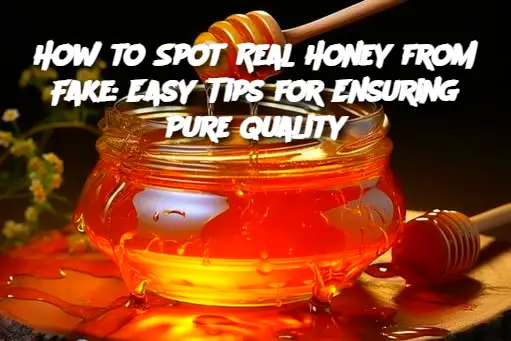How to do it: Taste a small amount of honey.
What to look for: Pure honey should have a rich, floral flavor that varies depending on its type (e.g., clover, acacia, or manuka). Fake honey may taste overly sweet or have a flat, artificial flavor.
Why it works: Real honey has a complex, multifaceted flavor due to the diversity of nectar sources. Fake honey often lacks these nuanced flavors.
Tips for Serving and Storing:
Serving Suggestions: Use real honey to sweeten tea, drizzle over yogurt, or add to baked goods. It can also be a natural alternative to sugar in marinades, dressings, and smoothies.
Storage Tips: Store honey in an airtight container at room temperature. Honey naturally has a long shelf life, and it won’t spoil easily. However, keep it away from direct sunlight and moisture to prevent fermentation.
Recrystallization: If your honey crystallizes over time, don’t worry! You can simply place the jar in warm water (not boiling) to return it to a liquid state without damaging its beneficial properties.
Variants:
Raw Honey: This is unprocessed honey, typically filtered to remove debris but not heated or pasteurized. It retains most of the natural enzymes and antioxidants.
Manuka Honey: A specific variety of honey sourced from the Manuka bush in New Zealand, known for its potent antibacterial properties. It’s often sold at a premium price due to its unique health benefits.
Honeycomb Honey: This honey comes directly from the hive in its natural state, sealed in honeycomb. It offers a more rustic experience and is great for serving with cheese or on its own.
Organic Honey: Sourced from hives that are free from pesticides, antibiotics, or chemicals, organic honey is often regarded as a more environmentally friendly option.
FAQ:
Q: Is it possible for honey to go bad?
A: Honey has a very long shelf life due to its natural composition, which resists bacteria and spoilage. However, if exposed to moisture or stored improperly, it can ferment. Keep it sealed and stored at room temperature for the best results.
Q: Can fake honey be harmful to my health?
A: Fake honey made with added sugars or syrups is generally not harmful in small amounts, but consuming large amounts of low-quality honey may contribute to excessive sugar intake and related health issues, such as weight gain or high blood sugar.
Q: How can I find truly pure honey?
A: The best way to find real honey is to buy from local, trusted beekeepers or reputable organic brands. Look for labels that indicate “raw” or “unfiltered,” and avoid honey labeled as “honey blend” or “with added sugars.”
Q: Why does real honey crystallize, but fake honey doesn’t?
A: Real honey crystallizes naturally because of its glucose content, which forms crystals when the honey cools. Fake honey, often diluted with sugar syrups or water, doesn’t crystallize in the same way due to its altered composition.
Q: Can I use honey for medicinal purposes?
A: Yes, honey has been used for its medicinal properties for centuries. Raw honey, especially varieties like Manuka honey, has natural antibacterial and healing properties, making it useful for soothing sore throats, aiding digestion, and even promoting wound healing.
ADVERTISEMENT

